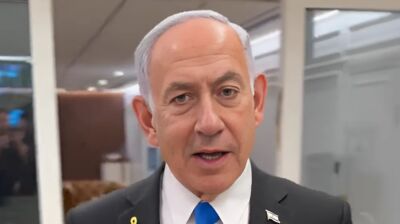Israeli Prime Minister, Benjamin Netanyahu, has leveled fresh accusations at Hamas, claiming the militant group is uninterested in brokering a ceasefire agreement.
His comments follow the release of distressing videos showing two visibly malnourished Israeli hostages, which triggered widespread condemnation and calls for urgent humanitarian intervention.
In response, Netanyahu reached out to the International Committee of the Red Cross, requesting that they facilitate the immediate delivery of food and medical supplies to hostages still held in Gaza.
The appeal came amid growing public pressure at home, with tens of thousands taking to the streets of Tel Aviv on Saturday evening.
Protesters, some bearing placards with messages like “Stop the war” and “Leave no one behind,” demanded swift action from the government to secure the hostages’ release.
The outrage stems largely from recent propaganda videos disseminated by Hamas and Palestinian Islamic Jihad, depicting hostages Evyatar David and Rom Braslavski in a severely weakened condition.
These images sparked international reactions, prompting the ICRC to state it was “appalled” by the footage, insisting that the “dire situation must come to an end.”
World leaders also voiced alarm. French President Emmanuel Macron labeled the videos “unbearable,” while German Chancellor Friedrich Merz declared, “the images show that Hamas should have no role in Gaza’s future.”
According to Netanyahu’s office, the prime minister personally contacted Julien Lerisson, the ICRC’s regional head, to urge the organization’s involvement in aiding the hostages.
His office also reiterated claims denying that famine exists in the territory, despite recent warnings from a UN-supported food security agency about a looming humanitarian catastrophe in Gaza.
Hamas responded by asserting that it would “deal positively” with any Red Cross request to assist the hostages, on the condition that humanitarian corridors are established throughout Gaza.
The group attributed the hostages’ condition to the broader collapse of basic services and worsening food insecurity.
Abu Obeida, spokesperson for Hamas’ military wing, al-Qassam Brigades, defended the treatment of the captives.
“They will not receive any special privileges amid the crime of starvation and siege,” he stated, adding that the hostages are eating the same food as Hamas fighters and civilians.
Meanwhile, Izzat Al-Rashiq of Hamas’ political bureau claimed the released footage offers “the definitive response to all who deny the existence of famine in Gaza.”
The World Health Organization recently reported a sharp increase in malnutrition-related deaths in Gaza, with more than 5,000 children under the age of five treated for malnutrition in the first half of July alone.
Humanitarian efforts to distribute aid remain fraught with danger, on Sunday, a shooting at a northern Gaza aid distribution site resulted in at least 13 deaths and dozens of injuries.
Permitting Red Cross access to the hostages would mark a significant shift in Hamas’ approach.
The ICRC has long lamented its inability to visit the captives, noting in March that the lack of access was “hugely disappointing,” while clarifying that the organization had made repeated attempts to gain entry.
Talks Stalled as Tensions Rise
Efforts to mediate a ceasefire have stalled, with both Israeli and American negotiators recently withdrawn from discussions.
US Special Envoy, Steve Witkoff, attributed the breakdown to Hamas’ disorganized approach and what he called a “lack of desire to reach a ceasefire,” adding that alternative strategies may be pursued.
Reacting to the latest hostage footage, Netanyahu condemned the militant group’s tactics.
“When I see this, I understand exactly what Hamas wants. They don’t want a deal. They want to break us with these horrifying videos, with the false horror propaganda they’re spreading around the world,” he said.
An Israeli official told CNN that Netanyahu now favours achieving the hostages’ release through a military victory over Hamas, an approach that has drawn criticism from the captives’ families.
“We are in discussions with the Americans. There is a growing understanding that Hamas is not interested in a deal,“ the official added.
Netanyahu is said to be pushing for a combined strategy involving hostage rescue and humanitarian aid directed to areas outside Hamas control.
Steve Witkoff met for nearly three hours on Saturday with families of the remaining hostages. According to the forum representing them, he assured them that securing the captives’ release is the US’ “first priority.”
Of the 50 individuals still believed to be held in Gaza, at least 20 are thought to be alive. CNN has reached out to Witkoff’s office for confirmation of the remarks.
Public discontent in Israel continues to mount as the conflict drags on. A survey from the Israel Democracy Institute conducted during a previous ceasefire in March found that over 70% of Israelis favored negotiating with Hamas for an end to the war in exchange for the hostages’ release.
Still, families of the captives remain firm in their plea to Netanyahu: reach a deal now.
In a statement on Sunday, the Hostages and Missing Families Forum warned, “Netanyahu is preparing the greatest deception of all. The repeated claims of freeing hostages through military victory are a lie and a public fraud.”
The forum also condemned Hamas, stating it “cannot hide the fact that we are dealing with an evil terrorist organization that has been holding innocent people in impossible conditions for over 660 days.”
While Hamas has repeatedly insisted that it remains open to hostage release negotiations, sources close to the group say it recently withdrew from all related discussions.
A senior Hamas official, Basem Naim, told CNN, “It is essential to improve the catastrophic humanitarian situation significantly and to obtain a written response from the enemy regarding our response.”
“This is a condition to go back to negotiations,” he added.
